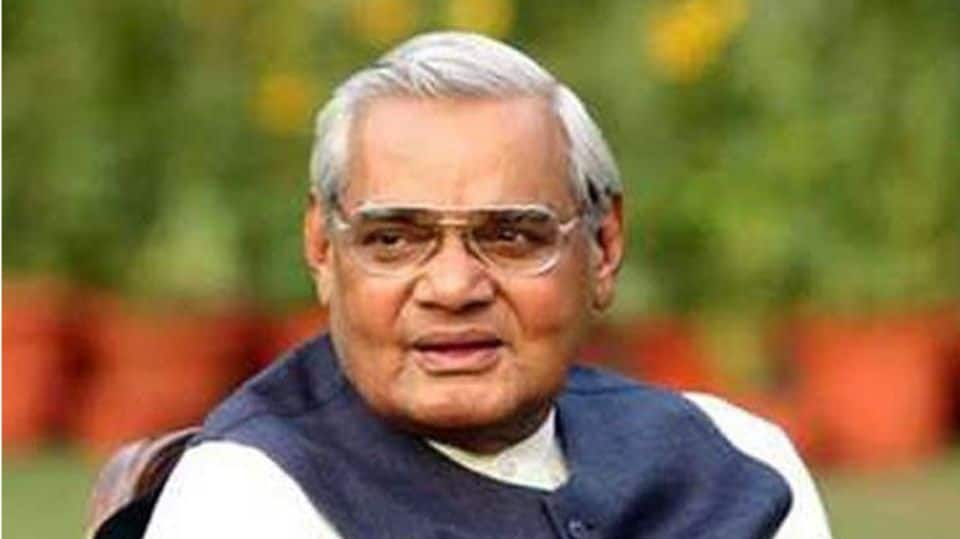
Chronicling Atal Bihari Vajpayee's journey on his 93rd birthday!
What's the story
An orator-par-excellence, darling politician, spirited statesman and BJP's tallest leader are adjectives that describe former PM Atal Bihari Vajpayee.
However, none does complete justice to the leader. Vajpayee not only built the strongest opposition to Congress's one-party rule but was also the first non-Congress PM to complete a full-term.
On Vajpayee's 92nd birthday, let's look at his prolific journey.
Early days
Born to a poet-father, Vajpayee took the legacy forward
Vajpayee was born in 1924 to a middle-class Brahmin family. His father Krishna Vajpayee was a school-master-cum-poet. His poetic skills passed on to Atalji. Vajpayee studied MA in political science from Kanpur.
Remarkably, when he joined law, his father enrolled with him as he too was interested. They shared a classroom and hostel room.
Interested in journalism, Vajpayee worked for Rashtradharma, Panchjanya etc.
Politics
Vajpayee began his political career as freedom fighter
Vajpayee's first brush with politics was as part of the Quit India movement in 1942.
As a student, Vajpayee had briefly flirted with communism; however, it was the RSS ideology that appealed to him. Later, influenced by Shyama Prasad Mukherjee, Vajpayee joined the newly-formed Bharatiya Jana Sangh in 1951.
He was elected to LS in 1957 from Balrampur, UP. Thus, Vajpayee's political career began.
BJP
Years as foreign minister and BJP's founder-member
In 1975, Vajpayee spent months in prison when the then-PM Indira Gandhi imposed emergency.
In its aftermath, in 1977, BJS became part of Janata Party government and Vajpayee, foreign minister. In this role, Vajpayee improved relations with China and Pakistan.
Further, he was the first person to address the UN general assembly in Hindi. In 1980, he became one of the founding-members of BJP.
Do you know?
Known for his liberal views, Vajpayee bemoaned the Babri demolition
Vajpayee didn't agree with the fellow-party member LK Advani's advocacy of Hindutva. When Hindu mobs razed Babri Masjid in 1992, he was one of the voices of dissent within BJP, remorsefully terming it BJP's "worst miscalculation." His liberal Hindutva won him admirers across the spectrum.
Unlucky 13
The number 13 plays havoc
Vajpayee was always mocked for being "the PM that India never had." This changed in 1996. As the single-largest party, BJP was called to form the government. But, failing to secure allies, government lasted a mere 13 days.
The second prime-ministership in 1998 lasted 13 months after ally AIADMK abandoned the ship.
Finally, in 1999, Vajpayee secured enough majority to complete a full term.
PM Vajpayee
As PM, Vajpayee made India nuclear, attempted to resolve Kashmir-issue
As PM, with Pokhran II, Vajpayee pushed India into the nuclear club. Funnily, it was done in such secrecy that US' CIA also didn't guess the tests. Vajpayee was censured for this act, internationally. However, it opened up the privileged nuclear club.
Vajpayee also tried to resolve Kashmir-issue, launched a Delhi-Lahore bus service. However, Pakistan ditched him, leading to the Indo-Pak Kargil war.
Legacy
Finally, what can this generation of politicians learn from him?
After his defeat in 2004 LS polls, Vajpayee retired from politics. He was conferred the Bharat Ratna in 2014.
But, what lessons did he leave for today's politicians?
Vajpayee never crossed the line of civility. Despite being a staunch critic of Jawaharlal Nehru and Indira Gandhi, he didn't hesitate to praise them. He believed in the principle of agreeing-to-disagree, never belittling the opposition.